Dennis Diefenbach
QAnswer: Towards Question Answering Search over Websites
Jan 17, 2024Abstract:Question Answering (QA) is increasingly used by search engines to provide results to their end-users, yet very few websites currently use QA technologies for their search functionality. To illustrate the potential of QA technologies for the website search practitioner, we demonstrate web searches that combine QA over knowledge graphs and QA over free text -- each being usually tackled separately. We also discuss the different benefits and drawbacks of both approaches for web site searches. We use the case studies made of websites hosted by the Wikimedia Foundation (namely Wikipedia and Wikidata). Differently from a search engine (e.g. Google, Bing, etc), the data are indexed integrally, i.e. we do not index only a subset, and they are indexed exclusively, i.e. we index only data available on the corresponding website.
Fine-tuning Strategies for Domain Specific Question Answering under Low Annotation Budget Constraints
Jan 17, 2024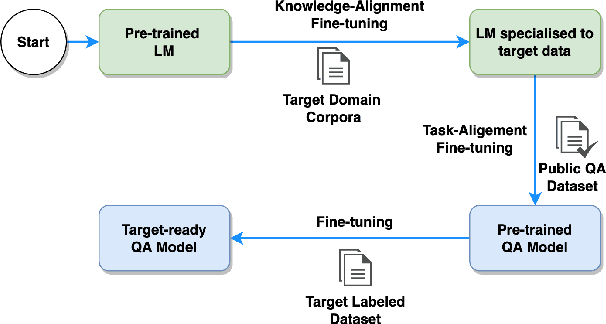

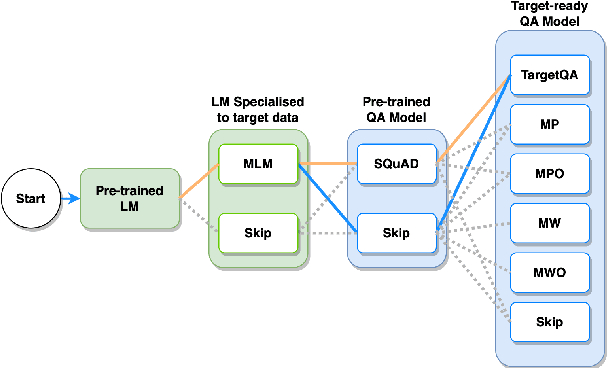
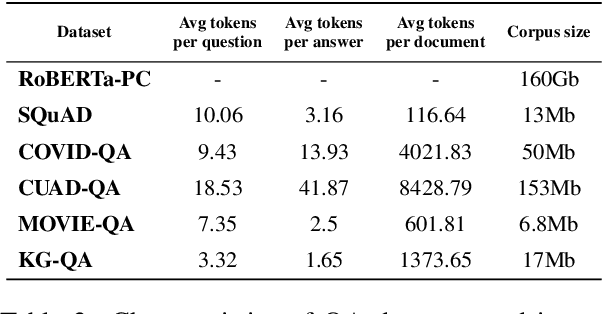
Abstract:The progress introduced by pre-trained language models and their fine-tuning has resulted in significant improvements in most downstream NLP tasks. The unsupervised training of a language model combined with further target task fine-tuning has become the standard QA fine-tuning procedure. In this work, we demonstrate that this strategy is sub-optimal for fine-tuning QA models, especially under a low QA annotation budget, which is a usual setting in practice due to the extractive QA labeling cost. We draw our conclusions by conducting an exhaustive analysis of the performance of the alternatives of the sequential fine-tuning strategy on different QA datasets. Based on the experiments performed, we observed that the best strategy to fine-tune the QA model in low-budget settings is taking a pre-trained language model (PLM) and then fine-tuning PLM with a dataset composed of the target dataset and SQuAD dataset. With zero extra annotation effort, the best strategy outperforms the standard strategy by 2.28% to 6.48%. Our experiments provide one of the first investigations on how to best fine-tune a QA system under a low budget and are therefore of the utmost practical interest to the QA practitioners.
Wikidata as a seed for Web Extraction
Jan 15, 2024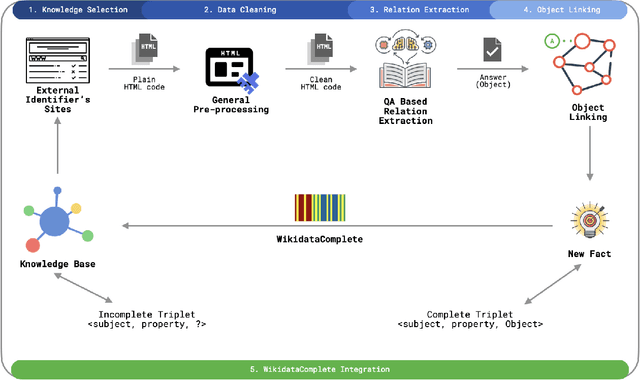

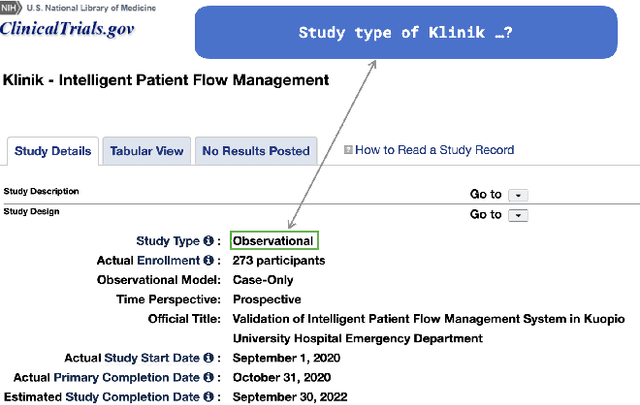
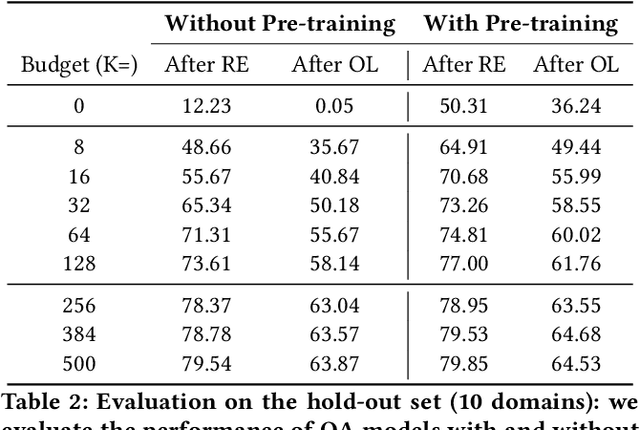
Abstract:Wikidata has grown to a knowledge graph with an impressive size. To date, it contains more than 17 billion triples collecting information about people, places, films, stars, publications, proteins, and many more. On the other side, most of the information on the Web is not published in highly structured data repositories like Wikidata, but rather as unstructured and semi-structured content, more concretely in HTML pages containing text and tables. Finding, monitoring, and organizing this data in a knowledge graph is requiring considerable work from human editors. The volume and complexity of the data make this task difficult and time-consuming. In this work, we present a framework that is able to identify and extract new facts that are published under multiple Web domains so that they can be proposed for validation by Wikidata editors. The framework is relying on question-answering technologies. We take inspiration from ideas that are used to extract facts from textual collections and adapt them to extract facts from Web pages. For achieving this, we demonstrate that language models can be adapted to extract facts not only from textual collections but also from Web pages. By exploiting the information already contained in Wikidata the proposed framework can be trained without the need for any additional learning signals and can extract new facts for a wide range of properties and domains. Following this path, Wikidata can be used as a seed to extract facts on the Web. Our experiments show that we can achieve a mean performance of 84.07 at F1-score. Moreover, our estimations show that we can potentially extract millions of facts that can be proposed for human validation. The goal is to help editors in their daily tasks and contribute to the completion of the Wikidata knowledge graph.
QALD-9-plus: A Multilingual Dataset for Question Answering over DBpedia and Wikidata Translated by Native Speakers
Feb 07, 2022



Abstract:The ability to have the same experience for different user groups (i.e., accessibility) is one of the most important characteristics of Web-based systems. The same is true for Knowledge Graph Question Answering (KGQA) systems that provide the access to Semantic Web data via natural language interface. While following our research agenda on the multilingual aspect of accessibility of KGQA systems, we identified several ongoing challenges. One of them is the lack of multilingual KGQA benchmarks. In this work, we extend one of the most popular KGQA benchmarks - QALD-9 by introducing high-quality questions' translations to 8 languages provided by native speakers, and transferring the SPARQL queries of QALD-9 from DBpedia to Wikidata, s.t., the usability and relevance of the dataset is strongly increased. Five of the languages - Armenian, Ukrainian, Lithuanian, Bashkir and Belarusian - to our best knowledge were never considered in KGQA research community before. The latter two of the languages are considered as "endangered" by UNESCO. We call the extended dataset QALD-9-plus and made it available online https://github.com/Perevalov/qald_9_plus.
Towards a Question Answering System over the Semantic Web
Mar 02, 2018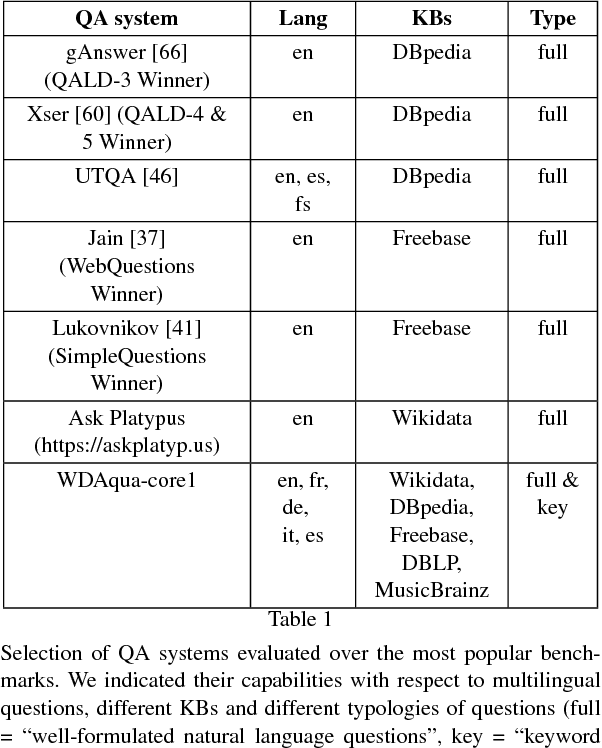
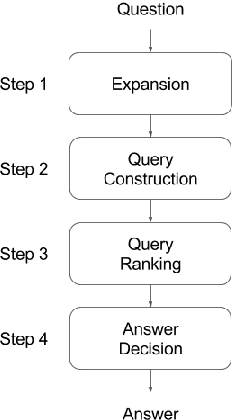
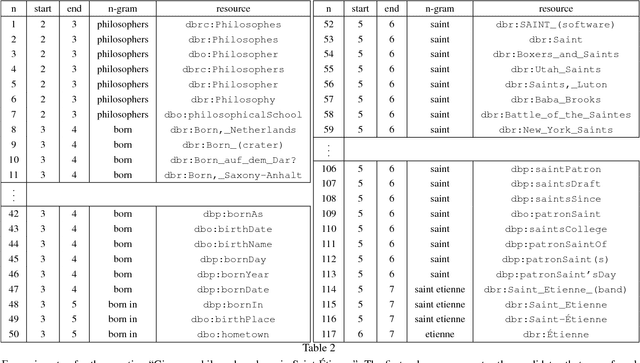
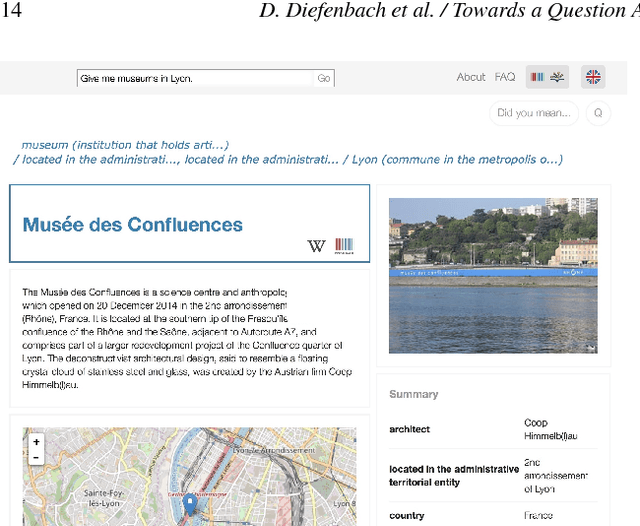
Abstract:Thanks to the development of the Semantic Web, a lot of new structured data has become available on the Web in the form of knowledge bases (KBs). Making this valuable data accessible and usable for end-users is one of the main goals of Question Answering (QA) over KBs. Most current QA systems query one KB, in one language (namely English). The existing approaches are not designed to be easily adaptable to new KBs and languages. We first introduce a new approach for translating natural language questions to SPARQL queries. It is able to query several KBs simultaneously, in different languages, and can easily be ported to other KBs and languages. In our evaluation, the impact of our approach is proven using 5 different well-known and large KBs: Wikidata, DBpedia, MusicBrainz, DBLP and Freebase as well as 5 different languages namely English, German, French, Italian and Spanish. Second, we show how we integrated our approach, to make it easily accessible by the research community and by end-users. To summarize, we provided a conceptional solution for multilingual, KB-agnostic Question Answering over the Semantic Web. The provided first approximation validates this concept.
 Add to Chrome
Add to Chrome Add to Firefox
Add to Firefox Add to Edge
Add to Edge